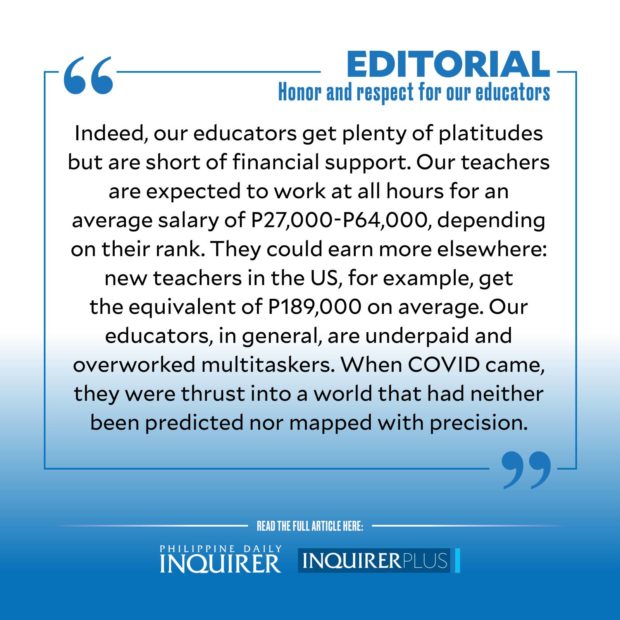Honor and respect for our educators
 The Basic Education Report 2023, presented by Vice President and Education Secretary Sara Duterte last week, confirmed what is not exactly a secret: an education system that has failed Filipino learners.
The Basic Education Report 2023, presented by Vice President and Education Secretary Sara Duterte last week, confirmed what is not exactly a secret: an education system that has failed Filipino learners.
Lack of school infrastructure and resources, Duterte said, is the most pressing issue facing basic education—out of 327,851 school buildings in the country, only 104,536, were in good condition. Then there is the problem of literacy, with Filipino children scoring heartbreaking lows in reading and math compared to learners from other countries. Based on data from the Programme for International Student Assessment, 81 percent of Filipino students who participated in the study could not solve math problems, 81 percent had trouble understanding moderate-length texts, while 78 percent could not determine the correct explanation for scientific phenomena.
This puts the spotlight on our knowledge frontliners—the over 800,000 teachers in public schools and over 190,000 in private schools, the thousands of college instructors and professors. Are they to blame for the poor quality of our education? Certainly not, as affirmed by Duterte who pointed out that the K-to-12 curriculum has also failed our educators.
“This is a system that burdens them with backbreaking and time-consuming administrative tasks, a system that provides no adequate support and robs them of the opportunity to professionally grow and professionally teach, assist, and guide our learners,’’ she said in her report.
Indeed, our educators get plenty of platitudes, but are short of financial support.
Our teachers are expected to work at all hours for an average salary of P27,000-P64,000, depending on their rank. They could earn more elsewhere: new teachers in the US, for example, get the equivalent of P189,000 on average. Our educators, in general, are underpaid and overworked multitaskers.
When COVID came, they were thrust into a world that had neither been predicted nor mapped with precision. They had to move their classes online, which was problematic from both a pedagogical and logistical perspective.
Online classes work best with stable internet connections, and when students are highly motivated to learn. Our educators had to hold online classes, for all grades from primary to graduate school, with resentful, disengaged students, in a country whose internet connection ranges from slow to spotty.
Our teachers made do with our resources, used their gifts. Some made songs out of their lessons, others delivered their online lectures with brave excitement, and still, others visited students in their homes to ensure that class materials were distributed and answered.
All this, while the government agency that supposedly saw to their needs also issued laptops that were unwieldy, outdated, and overpriced.
All this, while they had to teach children who knew that they could not go out and play with their classmates, but who did not have a full understanding of the repercussions of their confinement.
All this, while they had to deal with young adults whose previously hidden psychological woes suddenly surfaced in their isolation: some were so anxious that they could not work, others were kept at home with abusive families, and still, others were forced to understand information, even when they could barely understand themselves.
And, as election season came, our educators had taken on yet another uneasy role—the voice against the rising tide of disinformation.
They were mocked, laughed at, called purveyors of fake news, even as they worked with facts that had long been established and substantiated. They contended with a culture that looked down on the childlike gifts of curiosity and critical thinking. They battled against people increasingly losing trust in the news and turning to online sensations that had neither credibility nor genuine compassion.
Our educators are about to face decades of hardship yet.
As of late 2020, four million students dropped out of school. These students will have to catch up by enrolling with younger cohorts, swelling class sizes even more, beyond the capacity of the planned hiring of 10,000 new teachers.
There is also no guarantee that online classes have been able to deliver the same quality of education that onsite classes have. Our teachers might feel the effects of the online mode of learning in a few years’ time. They will have to teach students who have been socialized into bad learning habits: the kids who can’t do independent work because their parents answered their modules for them, the teens who can’t engage in in-person systematic discussions because they were so used to hearing and contributing to ad hominem insults online, the young adults fatigued from online work who cannot productively engage in the self-directed learning that college education requires.
The three years of the pandemic heightened and prolonged the deepest problems of our educators, our unsung heroes.
To them, we sing both honor and respect.




















